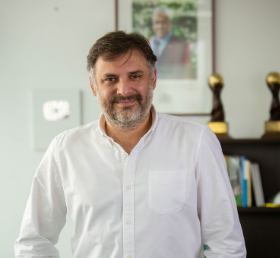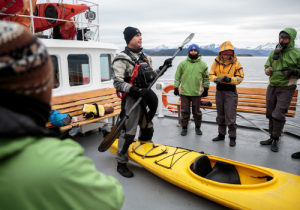Este artículo puede encontrarlo también en español abajo
ATTA’s AdventurePro program engages ISO-experts who work with destinations to evaluate local legislation and help adventure tourism become regulated based on global best practices. Standard and certification work can stimulate the local supply chain and activate local stakeholders. The country of Chile recently completed the first phase of the AdventurePro work focusing on stakeholder engagement and developing a roadmap for improving regulations and building capacity in the Adventure Tourism Sector. Below, ATTA’s President Casey Hanisko interviews José Luis Uriarte, SubSecretario de Turismo, Ministerio da Economia, Fomento y Turismo in Chile, and ATTA AdventurePro team Gustavo Timo and Andres Diaz to learn more about the process during such a challenging year for the industry.

Q: What factors led Chile to dedicate the time and resources to this important project?
A: José Luis Uriarte, Chile
For our country, this is an issue of the utmost importance. Chile has ideal natural conditions for the practice of adventure tourism and, in addition, we have carried out a strategic work of several years, between the public and private sectors, which has led us to position ourselves as one of the leading destinations for adventure tourism at the global level.We believe that Chile has a lot of room to continue growing and being competitive in this area. That is why it is essential to work seriously and responsibly so that the regulation of the practice of adventure tourism in Chile is in line with the highest international standards. On the one hand, putting a strong emphasis on safety; and on the other, allowing an adequate development of the activity.
Q: COVID-19 changed the approach to the program since it had to be done virtually. The ATTA team mentioned that it created some opportunities for wider engagement with virtual meetings and presentations. Do you agree this was positive, and do you have other reasons why you feel the timing was right for the project?
A: José Luis Uriarte, Chile
The project developed together with ATTA initially contemplated visiting some destinations where adventure tourism has developed in a competitive way, with the aim of capturing the strengths and understanding the critical aspects that have led them to success.
The quarantines led us to adapt this work through 100% online meetings, interviews, workshops, and webinars. As a result of this adaptation, we had the opportunity to work with the 16 regions of Chile and with a number of participants much greater than the initially established, reaching more than 2,000 companies and people involved. So, despite the fact that face-to-face work has characteristics that are difficult to replace, reaching this number of people is undoubtedly very positive.
Regarding the opportunity of the moment to carry out this consultancy, we are convinced that to implement improvements that bring benefits to tourism the best time will always be today. We never thought, despite the difficulties, of delaying an initiative that is so important for our sector.
Q: What is the next step with the project in Chile and can you tell me a little more about who some of the most important stakeholders were?
A: José Luis Uriarte, Chile
Now we must continue working together with all the actors that make up this sector in order to effectively improve standards and continue to position ourselves as leaders in adventure tourism at the international level.
The most relevant actors have been and will continue to be the people and organizations that give life to this sector: adventure tourism associations, guides associations, public bodies such as Conaf, in the case of National Parks; the Ministry of Sports and the sports federations linked to adventure tourism, the municipalities, the Chilean Navy, in the case of the coastal borders and the existing governance in the different tourist destinations.
A: Andres Diaz, ATTA
We concluded the first phase focused on understanding the reality of Chile Adventure Travel Regulations and most important developing a RoadMap for Chilean Government and Stakeholders to follow in order to improve the Chilean adventure tourism competitiveness.
The next phase is to start implementing this roadmap. For a successful process, the partnership between the public and private sectors, which involves strengthening the private sector leadership, updating technical standards, among other capacity-building actions, is absolutely necessary.
Q: Gustavo, you worked closely on our AdventurePro project in Jordan, what similarities or differences did you experience that might be interesting for the industry to understand when considering the importance of adventure travel standards in their destination?
A: Gustavo Timo, ATTA
The common challenge is that the private and public sectors aim for the same goal, which is safe and sustainable adventure travel experiences offered to the market but they often struggle to find common ground on how to get there. We use standards as a strategic tool to facilitate this process, build trust, develop dialog, and a shared future vision of success. Most importantly, we provide a practical and doable solution that can be implemented for all companies and guides no matter their size, activity they offer, and level of maturity.
Q: Adventure travel and outdoor activities are expected to come back more quickly than mainstream tourism experiences, do you believe that now is the time to focus on improving regulation and capacity building while visitation is low?
A: José Luis Uriarte, Chile
Many companies have used the forced downtime that the pandemic has meant to carry out strategic planning and establish improvements in their operation. We as a Government have taken advantage of these months to work with the sector and look for areas for improvement. The fact that we are starting to reactivate ourselves also allows us to understand how we want to return, under what standards we are going to operate, and what are the requirements that we consider necessary to remain a competitive destination and leader in adventure tourism in the long term.
A: Gustavo Timo, ATTA

The research and data is showing that adventure travel and nature-based tourism will experience a boom in demand. Now is the right time to improve and/or implement safety standards and take advantage of the opportunity that companies are open and willing to be prepared for reopening and recovery. On top of that, additional health and safety measures are easier to implement if you have regulations in place that are based on safety and risk management standards.
Q: Domestic tourism is likely to continue to be important to all destinations, have you taken time to consider the importance of the standards work when considering the needs, skills, and values of the domestic market?
A: José Luis Uriarte, Chile
In the short term, the reactivation of tourism will be thanks to Chileans moving through the country. The restart of tourist activity, as we have seen, will be step by step, starting in the communes, extending to the regions, and then continuing with trips between the regions of Chile and, gradually, also recovering international visitors.
In this scenario, the national tourist becomes especially relevant in the recovery process. Chilean tourists have a different behavior from international tourists. However, the standards are no less demanding if we speak, for example, of the security that a company must require in its operation or in the quality of customer service.
A: Gustavo Timo, ATTA
One of the main benefits of adventure tourism standards is that they are discussed exhaustively to fit the demand of customers from all markets. So for countries with strong domestic tourism, it is of paramount importance to have well-established standards for safety. An accident with a foreigner or with a national citizen has the potential to create the same harm to a destination. The ISO standards have been discussed by more than 80 countries to fit different contexts and development levels.
Q: Other countries have expressed interest in AdventurePro, what advice would you give them so they can have success as they navigate the complex needs of local suppliers, guides, NGOs, and governmental organizations?
A. José Luis Uriarte, Chile
The most important thing to keep in mind when seeking to establish strategic improvements that drive a country to be globally competitive is that this work cannot be carried out in isolation. Governments and public institutions must coordinate closely with the private sector, businesses, guides, and civil society organizations. It is the only way that we see feasible if we want to achieve binding and high-impact results.
